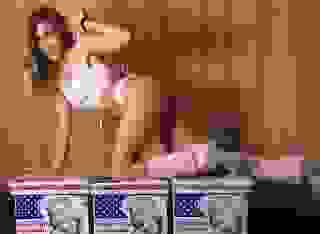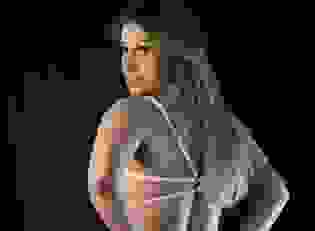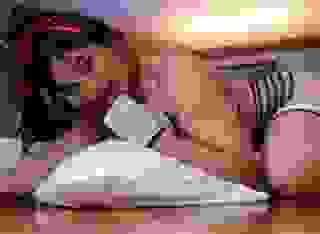- Romance
- Dark Passage
- Page 7
Note: You can change font size, font face, and turn on dark mode by clicking the "A" icon tab in the Story Info Box.
You can temporarily switch back to a Classic Literotica® experience during our ongoing public Beta testing. Please consider leaving feedback on issues you experience or suggest improvements.
Click here"Ah, Shannon, negative on the transponder; we're still picking up search radars up here and don't want to give away our position."
"Uh, two nine alpha, if I might be so bld as to ask, what makes you think you can avoid search radar, over?"
"Shannon, we have about one five minutes of fuel on board and need to land. Can you advise the active and information x-ray please, and can you advise if there are survivors from the BA crash last night?"
Another voice came back this time, a voice that at once sounded more professional, and thankfully, more in control. "Two nine alpha, runway zero six is open again at this time. You can try for runway three zero if you like. Barometer is two niner niner four, wind out of the northeast at three, broken clouds at fifteen thousand feet, then solid cloud from twelve to five thousand feet. Be advised there is substantial small rubble on the threshold of runway zero six at this time, and we have limited emergency services available. Also, we have no specific information on crash survivors at our location, but be advised there were thirty four casualties on BA flight that attempted landing here last night."
"Understood Shannon. We'll take runway zero six."
"Two nine alpha, can you advise your ETA?"
"Two nine alpha, about three minutes."
"Two nine alpha, still negative radar contact. Advise altitude, and are you sure of your position?"
"Two nine alpha, we're at forty five hundred, twelve miles out, and have the runway in sight."
There was a long pause, then . . .
"Bloody Hell! Two nine alpha . . . is that a (?!) . . . uh . . . two nine alpha understand your position, you're clear to land on runway zero six, wind now zero-one-five at eighteen, gusts to twenty three."
"Two nine alpha at the outer marker."
"Two nine alpha, we have no ground control at this time, so stay with me on this channel after you land, and, uh, we'll try to find an empty hanger to put that thing in."
"Two nine alpha, understood, over the inner marker."
Hayward was conscious that this would most likely be the last time he landed an airplane in his life, and he flared the giant wing over the threshold and the B-2 settled gently onto the concrete and began it's long roll-out. Even from out here he could see hundreds of people standing around staring at the B-2. He suddenly felt very naked and alone . . .
"Two nine alpha, clear the runway as soon as you can. Take any ramp to your right hand side and stand-by."
Hayward turned off the runway and waited, then . . .
"Two nine alpha, follow that red truck headed out your way, would you? Also, be advised there is still a fair amount of aircraft debris scattered about, so keep an eye out, what?"
Hayward saw an old red airport service truck with rooftop strobes headed toward their position, and it turned in front of the huge B-2 and moved off down the taxiway toward a group of maintenance hangers. "Ah, two nine alpha, we've got the truck. Thanks for the heads-up."
"Affirmative, two nine alpha, and I suppose I might be the first to welcome you to Ireland."
____________________________________
Ground crew were busy shoving little single engine airplanes out of an old, disused hanger on the edge of the airfield when Spirit Two Nine Alpha rolled up on the tarmac and paused there, and Hayward looked out over the instrument panel at the men standing below with their mouths hanging open. He cut engine three, and while the turbine buried deep inside the huge black beast spooled down, he looked around at the low rolling hills. He felt disoriented, but he suspected that was the least of his worries, and he too realized that he probably wasn't the only person in the world who felt disoriented today.
There wasn't much point to running through the usual post-flight checklist, but Hayward was a professional, and he finished the job with his co-pilot. As they ran through the various lists item by item until it was complete. Hayward thought of all the money and resources that had been expended to create and maintain this utterly fantastic piece of machinery, but he wondered if those resources had been well spent. Time would tell, he thought. Time would tell.
A man on the ground waved orange batons over his head, then motioned the B-2 forward, and Hayward rolled on a little throttle and the bomber moved forward smoothly into the shadow of the hanger just ahead. He steered with the nose gear while the man below guided the bomber inside the old building, then Hayward saw the man make signal to cut the engines. Hayward locked the nose-wheel steering while the co-pilot cut engines one and four, then they finished the last checklist. After all was said and done, Hayward told the two men down in the countermeasures cockpit to break open the hatch and move on out.
Cool, clean air burst into the confined spaces of the cockpit when the hatch opened, and Hayward took a deep breath as the fresh scrubbed Atlantic air filled his lungs. He disarmed the ejection seat and twisted open the harness-straps and contorted his way over the center instrument console to the steps that led to the hatch on the belly of the airplane, and he looked down at the concrete of what was about to become - he suspected - his new home. It was then that a thousand memories of his father's ranch in Montana roared through his mind's eye again, and he turned away from the light for aa moment until he had composed himself again.
That was another life, a distant world that today no longer existed. He could imagine the devastation done to Montana as Russian missiles rained down on the silos spread around Great Falls like acid rain; he wondered what the native Americans on the reservations around Wolf Point thought about the coming of the white man now. Probably not good, he thought as he crouched in the belly of the beast. He turned toward the open hatch. It was time to leave now. There were questions he needed answers to.
Hayward stepped down the retractable ladder onto solid ground, and automatically he began to whistle the Duke's refrain from The High and The Mighty. Not ten hours ago he had been certain that he would never feel solid ground again, nor breath fresh air, but now he looked around at the green hills and the . . .
"Anyone around here doing radiation counts?" Hayward suddenly asked to the men assembled around him on the ground.
A man from the truck was walking over and came up time Hayward and the other men from the B-2; he was wearing an RAF flight suit. Hayward was startled by the man's appearance: he looked like a short, plump version of Peter Sellers as Group Captain Lionel Mandrake from Dr Strangelove, right down to the bushy moustache.
"Hallo there," the RAF officer chimed in. "I say, you managed to give us all quite a fright with that thing here. No radar signature at all, you know, and we couldn't even DF your radio signal. I think the old boy in the tower dropped dead away when he saw this beast on final. So, who might you be?"
"Deke Hayward, Colonel, ah, say is anyone doing any radiation monitoring yet?"
"Ah, yes, I thought I recognized you from Mendenhall. I take it you had a busy night, Colonel?"
"Yeah, you could say that. Listen, we've got radiation gear in the aircraft we can get down here if we need it."
"Come on, Colonel, lets get in the truck and take a ride, shall we? We can talk as we go, what? You men hop on in back," the British officer said as he made his was to the cab of the old Land Rover pick-up. Soon they were rumbling across the airfield, and Hayward looked at the massive hordes of airliners parked and abandoned all over the premises.
"I didn't know the RAF had officers stationed over here," Hayward said.
"I suppose I'm the first they've seen over here in quite a while. Not an altogether pleasant welcome, you might assume. By the way, my name is Ted Stevens, and we can dispense with rank for now, old boy. Don't think it really matters now, if you know what I mean." He paused to let that thought sink in while he drummed the steering wheel with his thumbs. "Anyway, Mr Hayward, I managed to land my Tornado here earlier this morning. Flew an air strike about 0200 against Russian forces rolling in Holland, before the French started tossing nukes all over the place. I don't suppose you saw much coming over now, did you?"
"Any city of consequence looked like it was on fire. Lots of airborne search radar showing up all the way in, though. Mainly Russian stuff."
"They must have been planning this show for quite some time, eh? Well. I didn't want to talk about radiation levels around civilians, you know, but yes, we've had some stuff pre-positioned here since the bad old days. Background radiation is still around 25. One can stay out in it for hours right now. I suspect within a few days that will change. Anyway, we ought to be able to hang on for a few more weeks. Then I suspect it won't really matter any longer, will it?"
Hayward looked across the field to the wreckage of a British Airways 747, and he suppressed the overwhelming need to ask about it for a little longer.
"Anyone organizing building shelters, stockpiling food and such?"
"Oh come now, Hayward! Really, what's the point, hmm?"
"The point? Life is the point, Captain. Surviving is the point, Captain. Rebuilding what we had is the point, Captain! Is that clear enough for you, Captain! And if you ever address me by anything other than Colonel, ever again - even once, you'll need a surgeon to get my foot out of your asshole! Is that clear, Captain!"
"Sir!"
____________________________________________
Off the coast of Ireland
60 Years Later
The young man stood on the prow of the sailing boat and stared at the emerald hills that lay across the far horizon, and he wondered if it was real - or if it was yet another vision. After forty five days at sea, he and the boat's crew were almost starving to death, and the little water they had left was turning foul inside the old plastic jugs that held it.
The young man's name was Paul, and he was dressed in a brown robe. There was a huge, silver crucifix hanging from his neck by a simple leather thong, and all the other men on deck were similarly dressed. The too stared in open mouthed wonder at the verdant landscape that the new day had revealed.
Their boat had left the coast of what had once been called The United States of America, from a spit of land not far from where the old colony of Jamestown, Virginia had once stood, and from that long, low tidal marsh, from those humble beginnings, Paul and his Acolytes had reached this long dreamt of moment.
It was just that now he could not believe what his eyes saw. The land of his home had been ravaged, it was said, by God in his displeasure. He had caused great sheets of ice to cover the land, and the land had been wiped clean, purified, and the land was only just now recovering from the long winter that had gripped it after God's War had ended.
Paul knew that the earth had been purified in this war, that decadence and Godlessness had been punished by a vengeful God intent on ridding the earth of unbelievers, and that the tribulations endured by the faithful had been meant to test the faith of those who claimed to believe. He knew that it was a part of God's plan that he go out into the world that remained and convert the heathen few that yet remained, to prepare their souls for the coming final judgement.
Paul knew little of geography, and even less of human science and history, but that did not matter to Paul, just as it had never mattered to his spiritual predecessors. Like all of the men on this and dozens of other ships that had sailed from New Bethlehem out toward the Old Lands in the last few months, Paul knew scripture, knew God's love, and finally, above all else, Paul knew the importance of converting unbelievers to the one true faith. It was imperative to do so before God grew tired of human duplicity and cast the survivors of His War down to the fires of Hell for all eternity.
But Paul was unprepared for what he saw now.
Paul's boat had departed New Bethlehem a month and a half ago, departed the city that had been founded and settled by the faithful that emerged from the caves almost ten years ago. The faithful emerged from their long exile with depleted stores and rampant illness, and had just barely survived by hunting game and gathering berries near the retreating pack-ice that covered the land. They had wandered toward the Atlantic coast and for some unaccountable reason had found warmer weather there, and more abundant game, and in time the faithful's numbers stabilized, and they grew even stronger in their faith, convinced that their good fortune was a sure sign that they remained in God's favor, and in steadfast in their resolve to move back out into the world and spread God's One True Word.
New Bethlehem embodied a culture that his forefathers would have recognized; most would have called the new settlement a fair representative of late paleolithic, or Stone Age culture. The survivors used only the most rudimentary implements by choice, for the faithful considered tools from the bygone era to be the instruments of Satan, and so were meant only to do Satan's work. The faithful lived in dwellings that any colonist at Jamestown - now almost four hundred and seventy years ago - would have recognized. They cooked by fire, read by candlelight, hunted game with spears and stones, and worshiped in open-air structures every morning and night of their lives. They gave Thanks to God for the Bounty they had Received, and knew the fruits of this life were the just rewards of their faith.
And so it was that Paul and his Acolytes had left New Bethlehem when the first signs of spring returned, and though it was cold when they left, the men soon found themselves afloat on a river of warm water that carried them of it's own volition onward into an unknowable future. They put their faith in God, for they knew they were instruments of His purpose.
But on this new day - as Paul looked upon green hills and rich farmland such as he had never even dreamed of before, it came to him that this land had appeared as if out of the mists of time, and he did not know how to react to what he saw. . . it was unknowable . . . beyond experience . . . and so therefore must be evil . . .
. . . there was a town just ahead, a town situated in a neat harbor, but this place was alive with people and strange . . . things. There were hundreds of people walking from white walled buildings with bags in their hands, and some were towing children behind as they walked to strange wheeled carts that moved of there own volition. There were small animals walking beside other people, and men in boats who seemed to be lifting fish from the sea in ropes and twine! There were boats that moved across the water without sails, indeed, these boats made odd noises and seemed to move through the water as if by magic. Paul looked upon this scene and did not understand it, but . . .
. . . the longer Paul looked at this new world he saw . . . the hand of Satan at work.
He grew fearful, and the others around him soon saw his fear, and they too grew silent, and then . . . full of dread as it came to them that this land would destroy their understanding of God.
But unfortunately most were now too hungry and dehydrated to consider running from these dangers, and even Paul knew that he must summon the faith necessary to go ashore and ask these Satanists for food and water. It would be his first real test. He must conquer his fear in order to triumph over evil . . .
"Peter, steer for the town. We will go meet these Devils on their terms, and we will convert them. It is the Will of God."
"The Will of God," the other men said even as they quietly doubted the wisdom of confronting so much darkness so early in their journey.
Paul soon watched with even more dread as a new boat left the harbor and moved out into the sea, moved out into the sea toward their boat. This new boat moved faster than the others they had seen, and seemed to move with more purpose, more resolve, as Paul knew Evil would when confronting the Truth of His Word. Paul knew this boat would represent a symbol of great power, a power of resounding evil, and he trembled inside as the boat knifed through the water - for him. Still, as he stood on the prow of his boat and watched the coming boat he willed himself to be strong for the coming trials he knew all men of faith must pass if they are to prove themselves worthy of God's Love. He knew the ways of evil; the Great Book contained everything he had ever needed to know about Good and Evil, and he knew that even now the book would give him strength in this, the hour of his greatest need. He had been among New Bethlehem's most studious young men, and he could now see the patterns of experience falling into place. All was as it should be, because all was happening according to His Plan.
And still Paul stood and watched the approaching boat . . .
. . . men stood on the bow of this new ship. Men with tools consecrated by Satan to bring death to the faithful . . . death to all . . .
Now, as the men grew near, Paul knew who these men were . . .
Paul knew that these were men who had survived God's War, and now - they were coming for him!
_______________________________________
Paul moved with his Acolytes through the strange new town, and though he was conscious of people staring at him, he did not feel hated or feared by these people, indeed, he could not even see hatred on any of the children's faces he saw. True, some children pointed, some even laughed, and even the shaggy haired animals many of the older children held by their sides seemed to smile at him as Paul and his group walked from the boat and up a long metal ramp. It was all very strange.
The next path they walked on was unlike any he had ever seen or heard of before. It was almost black, and though it was a hard as stone - it was - not stone. Paul remembered seeing scarred remnants of roads like these on his journey from the caves, but these looked almost brand new! The carts these people rode around in were stranger still! They made a strange whirring sound, and had funny looking doors that swung up and revealed brightly colored seats inside, and the people from the boat asked Paul and his Acolytes to sit inside the carts for the trip to their Ruler's home.
Paul sat in the cart and was soon terrified: he sat behind the men from the town - aghast at the unnerving speed these carts moved at; one of the men holding a wheel in the front of his cart said they were traveling on a 'road' - and moving at forty kilometers an hour, all words that meant nothing to Paul - had he in his terror even heard what was said. The men then gave Paul and his Acolytes water in strange containers, and the water was cold, as if it had just come out of the ground. Next they were given something even disconcerting- food they were told was called a sandwich. It tasted very foul to Paul, but he was so hungry he ate it, and gave thanks to God when the food did not kill him. He took this as another sign that God was watching over him.
In time they came closer to a large building made of stone; it was so large that Paul had first seen it when they were still very far away. It was, the man in the front of the cart told him, a very old building called a castle, and this castle had always been used by his country's Ruler. Paul looked at the huge, dark stone and was again filled with a deep sense of foreboding. The stone brooded over the landscape with a malevolent force that Paul felt in the deepest part of his soul. He could feel it, smell it, taste it in the very air that he breathed. The closer he came to the building, the more he wanted to run away from it's dark purpose, the more he wanted to flee across the sea - back to the safety of New Bethlehem - back to the safety of his studies.








